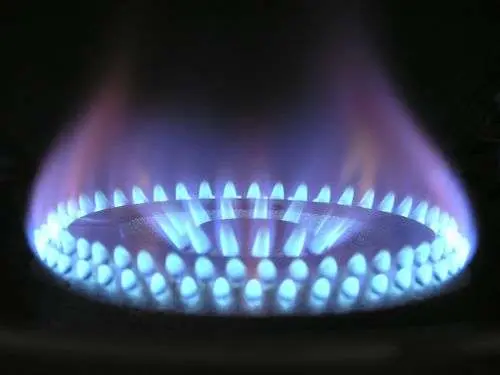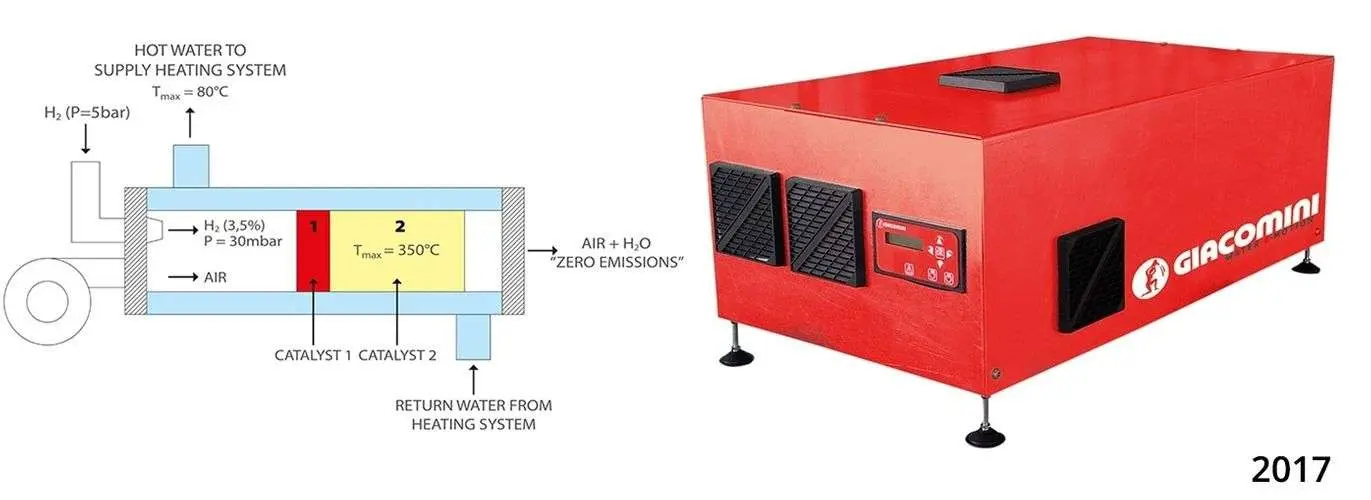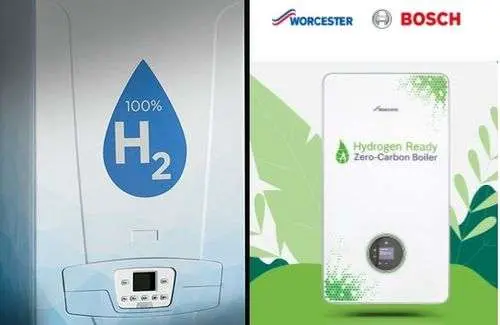The ‘hydrogen ready’ boiler market

The CO2 emission contribution from the building sector has been on the rise and reached nearly 10 GtCO2, which is about 28% of total global energy-related CO2 emissions, according to IEA estimates. The figure can even climb up to 38% if emission from the building construction industry is added. There is a huge scope to clamp down emissions from the building sectors, which is the third-largest polluter following industry and transportation.
Space heating and water heating are the two major culprits when it comes to energy consumption and CO2 emission from the building sector. Inefficient boilers and carbon-intensive power can further exacerbate the emission ratios.
Some advancements are coming in the heating systems, and hydrogen-powered boilers are one of them. However, this technology has not yet been fully commercialised. Hydrogen boilers are considered ideal replacements to natural gas boilers.
Hydrogen-ready boilers are hybrid gas-fired heating boilers capable of running on natural gas or 100% hydrogen. The good thing about using hydrogen is that it is a carbon-free gas which releases only water on burning whereas natural gas emits CO2 when combusted.
Types of boilers
Boilers are used for hot water or steam. There are three types of boilers systems: regular, system and combination (aka combi).
Regular boilers are traditional/conventional boilers that depend on a cold water tank for feeding the hot water cylinder to maintain the central heating system’s water level. On the other hand, system boilers do not rely on cold water tank but need a hot water cylinder for storing heated water. Combi boilers do not need any tank or cylinder and produce hot water on demand. It is also a water heater and central heating boiler in one compact unit. There is also a combined heat and power (CHP) boiler, which produce heat and electricity in one single process.
Most boilers worldwide are designed for natural gas, but other types are run on electricity, coal, oil, steam and wood.
- Hydrogen boilers can run on 100% hydrogen or natural gas.
- Gas boilers use natural gas as a fuel.
- Electric boilers use electricity to heat the water.
- Oil boilers are run on oil.
- LPG boilers use liquefied petroleum gas as a source.
- Biomass boilers burn wood pellets or wood chips to heat the water which is then used to heat the premises and provide hot water.
Hydrogen boilers technology
One type of technology which is being developed is an integrated boiler. In other words, the boiler can fulfil its energy requirement by producing hydrogen. In an ideal world, this is how the boilers should work and contribute to reducing emission. However, technology has not received much success. The cost could be one of the impediments as deploying such technologies requires funding.
Italy’s Giacomini was the first company which introduced the integrated system boiler technology back in 2010, following improving its burning hydrogen boiler technology. Its H₂ydroGEM boiler is available in the market since then. The boiler can produce hydrogen through internally fitted electrolyser by using electric power through solar panels. It releases oxygen as a by-product into the atmosphere and stores hydrogen in a tank which comes with the boiler. The boiler is powered by hydrogen with catalysts providing flameless combustion. It also sends hydrogen to an optional fuel cell system to produce electric power. The operating cost of running H₂ydroGEM is almost none.

Besides the integrated boiler technology, CHP (Combined Heat and Power) boiler technology uses fuel cells, with natural gas as input. The fuel cells perform an electrochemical reaction to produce heat and electricity. Currently, there are only two companies which offer this technology in the UK. One is the Bluegen which is a subsidiary of Italian company Solid Power Spa Group. The other is Germany’s Viessmann which developed the technology in partnership with Japan’s Panasonic.
Besides these two technologies, there is a fast-emerging technology, which is likely to replace natural gas with hydrogen. The technology offers hydrogen boilers, which replicates the same workflow like that of natural gas boilers.
Some critics told H2 Bulletin that hydrogen boilers are not bringing any major technical revolution. The only change it brings is to burn a different fuel, in this case, hydrogen. One of the main issues will be from where these boilers would source hydrogen? Would they use green hydrogen or fossil fuel-based hydrogen?
Hydrogen-powered boilers are also called ‘hybrid boilers’ as they are compatible with natural gas and 100% pure hydrogen. The UK’s Worcester Bosch, a part of Robert Bosch GmbH, and BDR Thermea Group are at the forefronts of developing such boilers. They have already developed and tested boilers which can run 100% on hydrogen. In pilot projects, they already installed hydrogen boilers in various places.
In theory, the boilers which Worcester Bosch and BDR Thermea are developing are also physically similar to the existing gas-based boilers. Therefore, hydrogen boilers can be installed without any additional repair works at homes. Worcester Bosch has been testing its boiler technology in uninhabited houses in the UK. It is a part of German multinational engineering and technology company Robert Bosch GmbH.
BDR Thermea Group claimed to put in operation the world’s first hydrogen-powered domestic boiler in a real-life condition in Rozenburg, the Netherlands. The company developed the technology at its BDR Thermea Group’s Research and Development (R&D) centre in Italy. It plans more field trials and aims to install hundreds of hydrogen boilers in the coming years. BDR Thermea Group is headquartered in Apeldoorn, the Netherlands and operates some leading brands including De Dietrich, Baxi, Remeha, Brotje, Chappee, Utica, Dunkirk and Baymak.

Similarities, differences and challenges
- Hydrogen boilers are installed and operate in the same manner as the natural gas boilers. No additional changes for installation are necessary.
- Similar to natural gas, hydrogen can also be distributed through the pipelines. However, in contrast to natural gas, hydrogen is less dense and have to be compressed and stored under high pressure. Hydrogen can also react to some metals and can even damage certain pipeworks.
- Similar to hydrogen, natural gas also has no odour at its normal state. An artificial smell is added to natural gas by using a chemical called mercaptan, to give it a distinctive smell to help detect in case of leaks. An artificial odour can also be added to hydrogen to resolve the leaking issue.
- Currently, it is challenging to produce hydrogen on a large scale in a cost-effective manner. Producing green hydrogen, which uses electrolysis method, is currently not cost-effective. Furthermore, the infrastructure to produce hydrogen on a scale has yet to be developed. Currently, the only approach that seems viable is producing blue hydrogen through steam methane reforming (SMR) method with Carbon Capture Storage (CSS) technology to make it environmentally friendly.
- Hydrogen can be slightly more prone to the risk of fire compared to natural gas as it can disperse more quickly. Since hydrogen has a lower density, it can spread easier in case of any leaks. However, the fast spread is also an advantage as it can quickly lose concentration.
- Natural gas burns with typical blue flame whereas hydrogen burns with a pale blue flame, which is hardly visible in the dark. However, hydrogen boiler technology will resolve such issues, especially flame detection.
- Structural changes to the existing pipeline infrastructure will be necessary to make it compatible for hydrogen transmission. However, that would be required when 100% hydrogen start flowing through the network.
- Switching to 100% hydrogen, there would not be any carbon element to provide an ionisation current. Consequently, boiler manufacturers would have to find out alternative methods.
Outlook
The future of hydrogen boilers looks promising and can be the best alternative to natural gas boilers to cut carbon emissions. However, the production cost of green hydrogen has to come down.
Keele University in the UK is running a project called HyDeploy to assess the viability of mixing 20% of hydrogen to natural gas in the national grid. It is believed that with a 20:80 blend, there is no need to change boilers or installation in the majority of the UK houses. The UK is aiming to start using 20:80 mix of hydrogen to natural gas by 2025. It implies that most modern boilers are ready to use natural gas with at least 20% blend of hydrogen.
At the end of the first quarter of 2021, around 650 homes in a small UK village near Liverpool, called Winlaton will be heated partially by hydrogen using 20:80 blends for a ten-month trail. The UK legislation does not allow hydrogen ratio of over 0.1% in the national grid mix at any time. HyDeploy claims that 20% of the gas mix is currently the highest proportion being tested in Europe.
It is estimated that around 150 millions domestic boilers are installed around the world. So, with the advent of hydrogen boilers technology, there is enormous replacement demand out there. Major boilers companies are trying to seize the opportunity as quickly as possible; though the legislation and lack of infrastructure are the major hurdles for deploying hydrogen ready boilers. To be profitable and cost-effective, these boilers need to be produced on a scale.